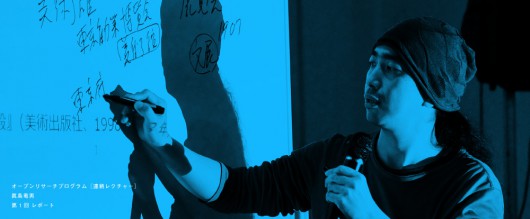Event
Open Research Program [Lecture Series] Tatsuo Majima “Series Title Under Consideration” (2) “To Whom Does Publicness Belong: (Two-Hour Lecture On) Art Museums, International Exhibitions, Contemporary Art, and Art”
September 21, 2014(sut) 17:00–19:00 (doors open at 4:30PM)
Admission: free
http://www.parasophia.jp/events/en/a/tatsuo-majima-2/
Artists: Yoshimasa Ishibashi
Venue
flowing KARASUMA
http://www.flowing.co.jp/index.php
Access: 645 Tearaimizu-cho, Nakagyo-ku, Kyoto 604-8152, Japan
Tel: 075-257-1451
Hours: –
Closed: -
Description
“Series Title Under Consideration” (2) “To Whom Does Publicness Belong: (Two-Hour Lecture On) Art Museums, International Exhibitions, Contemporary Art, and Art”
In Open Research Program 10 [Lecture Series] Tatsuo Majima “Series Title Under Consideration,” Parasophia invites Parasophia: Kyoto International Festival of Contemporary Culture 2015’s participating artist Tatsuo Majima to deliver a total of four lectures over the course of six months, from July 2014 to January 2015.
The first lecture, titled “Open and Close, Close and Open, Open and Fold, Fold and Unfold: (Two-Hour Lecture On) Japanese Modern and Contemporary Art,” was a two-and-a-half-hour tour de force based on Majima’s thorough examination and deep contemplation of the history of Japanese modern and contemporary art (see report).
For the second lecture, Majima has chosen the title: “To Whom Does Publicness Belong: (Two-Hour Lecture On) Art Museums, International Exhibitions, Contemporary Art, and Art.”* What sort of space was it that was “folded and unfolded”? What kind of space was it meant to be? What kind of space did the system create? In this lecture, Majima will discuss the issue of spaces in art, with international exhibitions among his references.
*…Translator’s note: The last “art” is the Japanese word āto [art], a word borrowed from the English “art,” rather than bijutsu [art], the word used in all other instances in his lecture titles for this series. The second half of this lecture’s original title in Japanese reads, “Bijutsu-kan, kokusai-ten, gendai-bijutsu, āto ni tsuite (no 2-jikan no lekuchā).”


![Open Research Program [Lecture Series] Tatsuo Majima “Series Title Under Consideration” (2) “To Whom Does Publicness Belong: (Two-Hour Lecture On) Art Museums, International Exhibitions, Contemporary Art, and Art”](http://180.235.238.228/wp-content/uploads/2014/08/slide_majima1_repo_ja-980x405.jpg)



